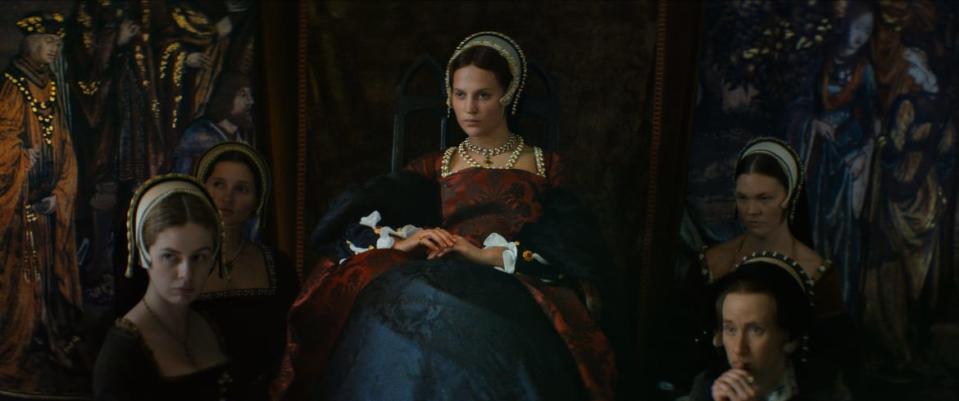Jude Law’s Revolting Performance as Henry VIII Ruins ‘Firebrand’ at Cannes

Earlier this month, photos of Charles III, the most recently appointed king of England, went viral following his lavish coronation—photos in which the new monarch and his queen, Camilla, appeared somewhat less than regal, sporting crowns and robes that looked like nothing so much as dress-up clothes at holiday camp. After decades during which Queen Elizabeth II was able to establish her own iconography, the King looks like… well, just some guy, with a golden hat and bad shoes.
That is also the case for Jude Law’s monstrous Henry VIII, in the new period drama Firebrand by Karim Aïnouz, centering on the life of Catherine Parr (Alicia Vikander), Henry’s sixth and only surviving wife. Here, Henry is depicted as an ordinary boor, a loud and coarse misogynist, and an abusive tyrant such as exists all around the world. Though he clearly believes in his god-given powers, this Henry is base and earthly, a man who bullies his court and who ruts atop his wife like a grunting pig.
Law’s characterization goes far beyond what is required of him, becoming an overstated, self-indulgent rehearsal of grotesquerie—but in principle at least this take on Henry concords with Aïnouz’s project. Firebrand seeks to humanize Catherine and Henry, stripping all the costume-y frou-frou away from the narrative and giving a pared-down, historically revisionist character study. Though the film is flittingly successful in this aim, Firebrand cannot escape all of the trappings of the period drama, and the result is an often anonymous, leaden object.
As the film begins, a voiceover from Princess Elizabeth, soon to be Elizabeth I, gives us a précis of Parr’s life, in which Henry’s sixth wife is—in an immediately worrying development—presented to us as a hashtag girlboss who could. That Parr was accomplished and intelligent is beyond historical doubt, but the film’s representation of her achievements is thin: we are in short order told about her writing, her being a model parent to her stepchildren, and her role as regent during Henry’s absence from the country. This is muddled and a bit contrived: Parr’s position as a regent was arrived at because of marriage and privilege rather than straight-up talent, but the film breezily invites us to regard her as some sort of feminist pioneer.
‘Killers of the Flower Moon’ Is Leonardo DiCaprio’s Best Performance Yet
This continues after the intro, in scenes where Vikander’s plain-spoken Parr visits a rabble-rousing activist, Anne Askew (Erin Doherty), who seeks to stir up anti-royalist sentiment among the populace. These moments feel artificial and manipulative: Askew is depicted as a thoroughly modern woman, adopting wholly modern language to speak to her public. This is supposed to reflect well on Parr, positioning her as an enlightened character, but there is a cheapness at play here; the contemporary idiom is a lazy shorthand whose aim is to rewrite Parr.
Throughout the film, the question of language prevails: Henry and Catherine, as royalty, would have been eloquent and strategic in their communication; here, their interactions are superficial and simplistic. A scene in which Henry states that a pregnant Catherine is carrying the next king “in her tummy” is laughable. Rather than trust audiences to latch on to the politics of the couple and of courtly behavior, in the way of writer Hilary Mantel’s works, Firebrand lazily resorts to a sort of listless contemporary dialogue, which on top of everything else has no color to it, no lyricism. Witness how Henry constantly resorts to barking “shut up” throughout the movie: that is a wholly childish approach, which shies away from presenting the character in all his complexity.

Parr’s dilemma is that Henry, a solipsistic oaf, belittles her, and represents a constant threat to her life. Vikander plays Catherine perhaps too steadily, not quite seizing on the constant fear for her existence that Parr might have felt; instead, this character veers between self-assurance, and disquieting moments when she is forced to submit to Henry’s iron will. That feels like it lacks nuance and depth, stemming again from the film's obstinate presentation of Parr as a stone-cold legend. Furthermore, the character appears to lack dimension: in contrast to Law’s scenery-chewing Henry, Catherine appears here as just a wife. That won’t hold a spectator’s interest for very long.
Not everything here is a failure—the film is more misstep than fiasco, perhaps due to a visionary director losing authorial control of a prestige film to his producers, who may have had a more conventional movie in mind from the outset. Among the more pleasing stuff, a nicely gruesome vein is developed here, centering on Henry’s hideous, suppurating leg wound, into which Parr is at one point instructed to drop live maggots.
Some hideous sex scenes, over-acted by Law, are nevertheless quite punchy in suggesting Henry’s base impulses, and showing how embattled Parr was as a woman, what humiliations she would have had to accept as her due. The film’s visual aspect is occasionally rich and attractive, in some wide-lens scenes shot with customary grace by DP Hélène Louvart; court life is depicted in a naturalistic way, shorn of artifice. That method is at its best in a couple of potent scenes where Henry, acting as a sort of despot, forces courtiers to sing along with him: there is no mystique to royalty here; the man is a hooligan, nothing more.
Cate Blanchett’s New Film Is a Major Flop at Cannes
As Firebrand goes on, the relationship between Parr and the king going from bad to worse, the film assays a final, quite ballsy act of historical rewriting, whose audacity is sadly far too late to save this unfortunately mealy object. A sad air of failure hangs over this project, which perhaps at one point in its early development carried some promise as a daring example of revisionism, whose artistic possibilities must have somehow attracted a great director like Aïnouz—but the result is a deeply compromised, hampered, ultimately anonymous film that wouldn’t be particularly out of place on Sunday night television.
Like this review? Sign up to get our weekly See Skip newsletter every Tuesday and find out what new shows and movies are worth watching and which aren’t.
Get the Daily Beast's biggest scoops and scandals delivered right to your inbox. Sign up now.
Stay informed and gain unlimited access to the Daily Beast's unmatched reporting. Subscribe now.

 Yahoo News
Yahoo News 
